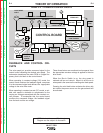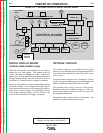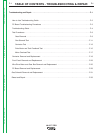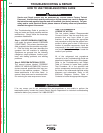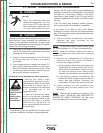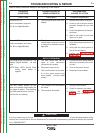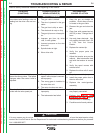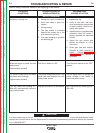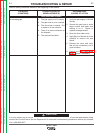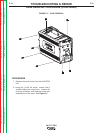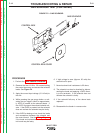
(.-).-)+(%&,
Observe Safety Guidelines detailed in the beginning of this manual.
)+(%&,
,2&)-(&,
)(,,"%+,(
&",#.,-&'-,
+(&&'
(.+,(-"('
If for any reason you do not understand the test procedures or are unable to perform the tests/repairs safely,
contact the Lincoln Electric Service Department for technical troubleshooting assistance before you proceed.
Call 1-888-935-3877.
.-"('
-+(.%,!((-"' +)"+
%'S)+(
Variable or “hunting” arc. 1. Wrong size, worn or melted tip.
2. Worn work cable or poor con-
nection.
3. Wrong polarity’
4. The gas nozzle is extended
beyond the contact tip or the
wire stickout is too long.
5. Poor gas shielding on process-
es requiring gas.
1. Replace the tip.
2. Verify all the work and elec-
trode connections are tight and
in good condition Clean if nec-
essary and replace.
3. Adjust polarity to recommended
procedure verify DIP switch 7
setting matches the electrode
polarity.
4. Adjust the gas nozzle and
shorten the stickout to 1/2 to
3/4 inches.
5. Check gas flow and mixture.
Remove or block sources of
drafts. Perform the GAS
SOLENOID TEST, replace if
necessary.
The preset voltage does not match
the power source voltage.
(Digital display models)
The preset voltage calibration in the
feeder has been selected for a dif-
ferent power source.
Use the setup menu to change the
preset voltage in the feeder to
match the power source.
When the trigger is pulled, the wire
feeds slowly.
(Digital display models)
The Run-in switch is “ON” Turn the run-in switch to the “OFF”
position.
Poor arc starts with sticking or “
Blast-offs”, weld porosity, narrow or
ropy looking beads.
Improper procedures or techniques. See “Gas metal arc welding guide”
(GS-100)
Return to Section TOC Return to Section TOC Return to Section TOC Return to Section TOC
Return to Master TOC Return to Master TOC Return to Master TOC Return to Master TOC



